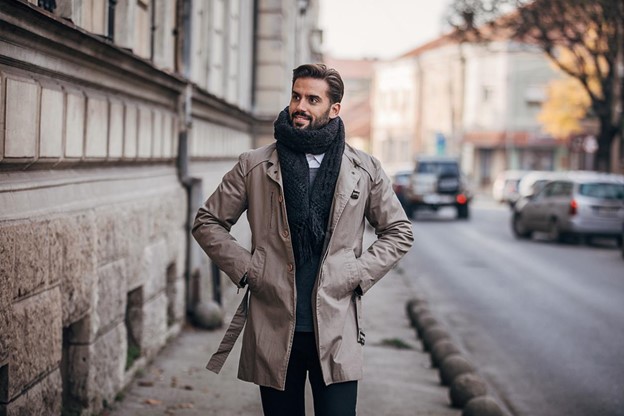What to look for in a winter jacket

In this blog, we’ve put together a selection of our top
tips to help you choose the ideal coat for this winter. From the best styles and materials to
how an insulated coat should fit and what you should expect to be paying, read
on as we tell you everything you need to know about these winter essentials.
Which type of coat is best for winter?
With so much choice when it comes
to winter coats, it’s hard to say which is best. This is mainly because each
has their pros and cons, with some designed with functionality in mind and
others more focused on style. For this reason, the best type of winter coat for
you will come down to personal preference and what you require from the item.
However, to help you decide which type of winter coat would be best for you,
check out our breakdown below.
- Traditional overcoats
A subcategory of winter coats that include classic topcoats, reefer jackets, duffle coats and peacoats, these garments tend to be made from heavyweight fabrics such as melton wool. They are designed to fit over other bulky items of clothing such as suit jackets or cardigans and sometimes extend past the knees. These winter coats represent a good balance of functionality, thanks to their heavyweight fabrics, and style, due to their typically timeless designs. A good option for both men and women.
- Waxed jackets
Famed for their country living look, waxed canvas jackets can be a good option, especially if you live in a warmer climate where winter temperatures are not too extreme. Typically thinner than overcoats, and rarely extending beyond the waist, waxed coats will not provide the warmth of woollen or synthetically insulated alternatives, however, they will offer fantastic protection against rain, snow, sleet and sludge.
- Puffer/insulation jackets
The first puffer jacket was designed in 1936 after its inventor, Eddie Bauer, claimed he nearly froze to death on a fishing trip. Since then it has been a staple for those keen on outdoor pursuits, as well as becoming more of a fashion statement in recent years (especially after designer Norma Kamali launched her famous ‘Sleeping Bag Coat’). Like sleeping bags, padded coats of this nature trap the natural body heat of its wearer, keeping them warm.
- Trench coats
As the name suggests, trench coats were invented during the first world war to keep soldiers on the front line warm during winter. Traditionally made from heavy-duty cotton gabardine drill, poplin or leather, these items tend to be more lightweight than other winter coats - meaning it’s advisable to wear something warm underneath. However, they do benefit from a timeless stylish design. Suitable for both men and women, trench coats also straddle the boundary of smart and casualwear, making them a very versatile option.
- Parka jacket
Traditionally made
from caribou or seal skin and made by the Caribou Inuits to withstand the
arctic climates of northern Canada, parka jackets are one of the best choices
of winter coat for extreme cold. Now usually made from nylon or
polyester/cotton blended fabrics finished off with a water-repellent coating,
these winter classics are characterised by well-insulated (puffer-like) torsos
that trap body heat, and large fur-lined hoods that protect the head and face
from strong winds and cold conditions. Parkas can be seen as both functional
winter coats and stylish fashion statements, however, can restrict movement.
How should an insulated jacket fit?
When it comes to choosing an insulated jacket that fits correctly, there are lots of factors to consider. Choose a jacket that is too tight and your body will compress the insulation, limiting its ability to trap body heat. On the other hand, if you choose an insulated jacket that is too loose, your body heat may be unable to heat all the dead space between your body and the inside of the coat. For this reason, to select an insulated jacket that fits correctly, you need to try on a number of sizes and models and consider a number of things. These include:
- How many layers you'll usually wear underneath - will you be wearing just a t-shirt, a bulky jumper, another jacket, etc.?
- The fit of the cuffs - while the cuffs should seal around your wrists and waist on a good puffer/insulated coat, they should still allow you enough room to comfortably move and feel totally unrestricted. If they do not, the coat you are trying is not a good fit.
- Can you lift your arms? - when wearing a well-fitting insulated coat, you should be able to lift your arms above your head without the hem of the jacket lifting more than an inch. If this is not the case, the jacket is too tight.
- Are your shoulders unrestricted? - both your chest and shoulders should have enough room to allow you to reach both hands behind your back until they meet without feeling restricted. If you feel restricted, or the zip starts to stretch while attempting this, the coat is too small.
- Should you size up in winter coats? -
this is common advice, but does not always follow. Each brand sizes items
differently, so it is important to try a coat on (both in your usual size and one
size up), or at least to check the measurements against existing items of
clothing you own if you are buying online, before making your decision.
How much should a winter coat cost?
Unsurprisingly, good winter coats represent one of the more expensive items of clothing in most people’s wardrobes. Regardless of whether this is because of the high-quality materials needed to make an overcoat look stylish or the expensive filling used to insulate a good-qualified puffer jacket, these items are essential.
While the cost of a coat will naturally vary depending on brand, style, material and size, as a rule of thumb, you should be able to pick up a good quality winter coat for between £50 - £150. Although, if you are after a designer winter coat, this figure could be much higher.
Copyright © 2025 Chums
PayPal Representative Example:
Representative 23.9% APR (variable) Purchase interest rate 23.9% p.a. (variable) Assumed Credit limit £1,200. PayPal Credit and PayPal Pay in 3 are trading names of PayPal UK Ltd, 5 Fleet Place, London, United Kingdom, EC4M 7RD. Terms and conditions apply. Credit subject to status, UK residents only, Chums Ltd acts as a broker and offers finance from a restricted range of finance providers. PayPal Pay in 3 is not regulated by the Financial Conduct Authority. Pay in 3 eligibility is subject to status and approval. 18+. UK residents only. Pay in 3 is a form of credit. Check if affordable and how you will repay. May make other borrowing more difficult or expensive. See product terms for more details.



